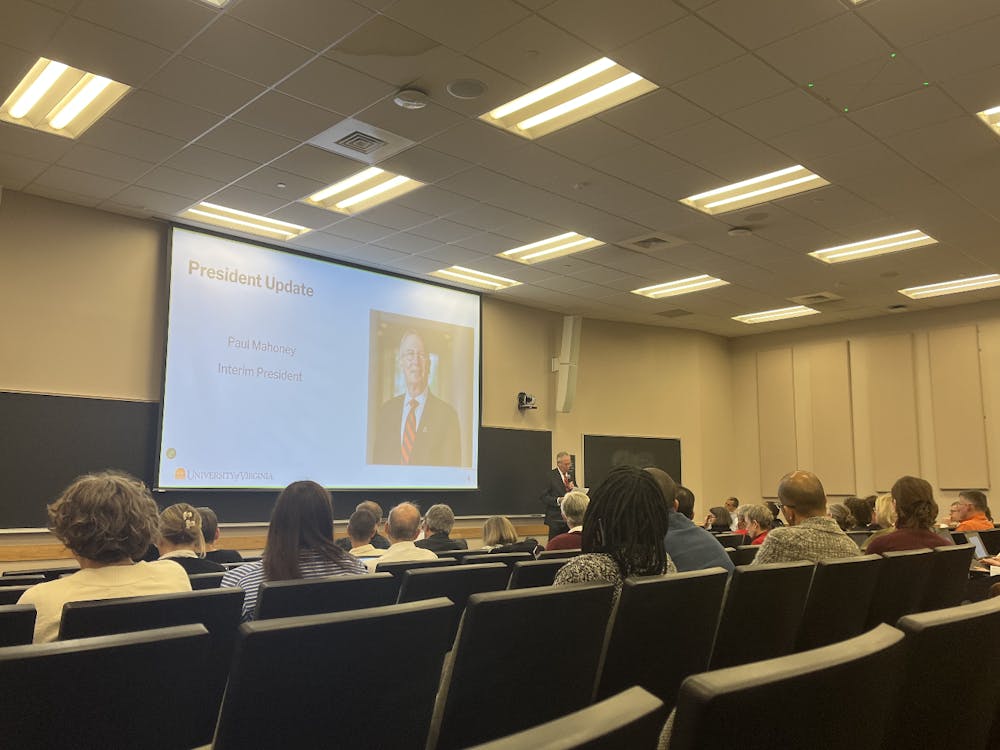In collaboration with Madison House, the newly established Inter-Greek Committee held its first significant community event Saturday as a means of kicking off its long-term agenda.
The IGC, founded last spring, is a 12 member organization comprised of two executive and one non-executive member from each of the four Greek governing bodies: the Inter-Fraternity, Inter-Sorority, Black Fraternal and Multicultural Greek Councils.
The committee was formed to promote education and awareness among the various councils, as well as coordinate joint community and social activities to help unify the University's Greek community.
Approximately 25 students participated in Saturday's event at Greer Elementary School, performing landscaping and blacktop painting projects. According to event organizers, the service activity successfully introduced goals the IGC will continue to pursue.
"The history of the IGC is really new," said Chris McGill, program coordinator for the office of fraternity and social life. "This is a great thing for the IGC to start off with. It gets all the councils together to work on community service -- a component important to all four councils."
ISC spokeswoman Cahill Zoeller, a member of the IGC, said she is proud of the event's outcome.
"I was excited by the collaboration of the Greek councils," Zoeller said. "I see the purpose of the IGC as a committee which fosters collaboration for Greeks at U.Va."
The IGC plans to follow up Saturday's event with further efforts promoting a strengthened relationship for its respective councils, organizations and members, IFC Spokesman Ryan Ewalt said.
Specifically, the committee intends to educate the University community by "planning inter-Greek events and fostering an environment conducive to clear communication," Ewalt said.
The IGC's keynote event of this semester, the State of the Greek System Address, will be held next week, he added.
As the IGC develops, Ewalt said the group hopes to create education and service subcommittees. The service subcommittee will pair various fraternities and sororities to perform community service projects on weekends -- similar to the previous efforts of "Comfort Zone"-- while the education subcommittee will facilitate understanding among the four councils, he said.
Educational efforts will begin with members of Greek executive councils, trickling down to chapter presidents and individual members, said Sara Rains, an undergraduate intern in the Office of Fraternity and Sorority Life.
Education is a particularly important component of the IGC's mission because "there are some fundamental differences as well as some common ground between all of us," said MGC Treasurer Melody Han, who is a member of the IGC. "Hopefully we will start a calendar system so we are aware of Council-wide activities, and there has been talk of starting some kind of service mixer program."
BFC Co-Chairman Michael Dunkley, a member of the IGC, said he is pleased with such proposals.
"I'm excited by any future events that provide a sense of unity, especially the State of the Greek System and community service projects," Dunkley said. "These are things we all share."
Aaron Laushway, assistant dean of students and director of fraternity and sorority life, said the changing dynamics of Greek life caused a need for the IGC.
"As fraternity and sorority life has evolved on the Grounds, new expressions of service and contribution have arisen," Laushway said. "I believe the IGC is a tremendously important vehicle for communication and collaboration among the four Greek governing councils and their member chapters."
As the IGC looks forward, many members are optimistic about the organization's potential effects on Greek life.
"The IGC is only its beginning stages," Dunkley said. "But it can only go uphill from here."






